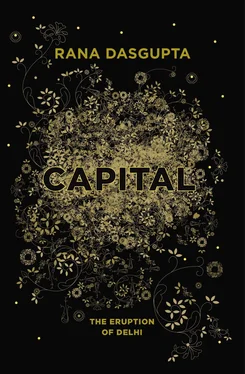“Another very drastic experience I had in Delhi was in my twenties. I was totally obsessed for years with one person. I would have done any damn thing to be with that man. To the extent of crazy things. It was not a little crush: it went on for five or six years. My friends told me I was blind, I was obsessed, but it just went on. It was horrible. And suddenly — I don’t know what happened to me — I got out after five years and I looked at the rest of my life and I said, ‘Wow . Now… ’ You know that kind of moment? You need to save yourself. These things forced me to be successful, to want something far more than money.
“I don’t need much money. I don’t have kids to invest for. As long as I can meet my friends, I’m happy. I am not the kind who wants fancy cars. The typical Delhi male — straight or gay — just wants to have the right car to drive into the hotel and park at the porch and get out of it with everyone looking at him. He buys his Porsche just for that moment. Maybe I’ve spent too much time in France, but I don’t care about that. In Paris you can walk into a famous artist’s party and there will be the richest and the poorest people, all at the same level. Nobody gives a damn. Or you can be very rich and still ride the oldest scooter because you love it. That doesn’t exist here. Here, if you have money, even if you don’t like a car you’ll buy it because it is meant to be the best. I love that about France. They don’t just value you for the money you have. Here they ask you straight away: ‘What do you do?’ It’s the first question they always ask you.”
As one might expect, Manish works like a man possessed.
“I live for my work. I believe in that and nothing else comes in between. I’m completely focussed. So that gives me opportunity to take care of the whole business of fashion, not just designing. I have the time to do all that. In Paris, being a designer is a job. It’s a job, like being a lawyer. In Paris I wake up at 6.30; I work from 8.30. I carry my own clothes: I carry boxes of clothes in the Metro. Can you imagine a designer here who would carry his own clothes? Here the designers think they’re superstars. They forget their job, which is to make better clothes every season. It’s a job. It’s fucking hard work. Just because you’re in the Indian newspapers all the time, you don’t forget, you don’t act like a star. Have you seen how much the newspapers write about fashion designers? Don’t they have anything better to do?
“India has not become fashion-conscious. No one knows about fashion. No one knows enough about themselves to be conscious of what they want. All that has happened is that people now have money and they are aware of brand names. When you meet people in Delhi who are supposed to be the fashionistas or divas: they have the right products in their hand but they know nothing. It is not like Japan. Even there, fashion is not so old but people understand fashion. Ask a woman in Delhi why she carries a Louis Vuitton bag, and she’ll tell you that’s the bag you’re supposed to carry. Ask a woman in Japan, and she’ll tell you the whole history of Louis Vuitton.
“But when I started out in Delhi, this ignorance was helpful. Now I’m in Paris so much I feel I started out in the right place at the right time. I was working in Delhi as an assistant to well-known Indian designers, and everyone was quite naive. I learned everything by doing it because I didn’t know anything. For example, I didn’t know — it’s very stupid but it’s true — I had never seen Interview magazine until my clothes were on the cover. I didn’t get intimidated by magazines because I never saw them. My naivety has worked in my favour because I always have so much more to learn. A guy in London already knows everything when he starts and it’s more difficult for him to do his own work and prove himself again and again. If I had been in London, maybe I’d be burned out by now.”
He takes out his laptop and shows me a video of his latest show in Paris, which was organised as a magic show. He explains how the show is put together: how a collection is conceived to cater simultaneously to buyers from Europe, America, Asia and the Middle East. His sentences begin, “I know you’re not interested, but… ” — and he goes on to explain materials and textures, how this was sewn, how that was designed on a computer and laser-cut. He talks about the clothes he made for Lady Gaga.
“I wish my parents could understand what I do. But that’s the problem with many people I have in my life: I’m growing so fast because of my experiences that no one else understands. The kind of knowledge I am gaining every day is making me so mentally rich, it’s making me so sharp, it makes me able to deal with every situation and every kind of person. I designed 200 stores for Nespresso: imagine dealing with a coffee company for eight months. I’ve watched them making Mercedes cars. It’s amazing how much you learn. I’m surprised every day at my life. Every day. Paco Rabanne can’t believe my enthusiasm: they’re surprised by me because growing up here you’re used to everything, you know? Nothing is a problem. I can listen to the opinions of ten people and convince all of them and still do what I want. Two years ago I would not have been able to do that. It’s come from working with brands like Nespresso where they have restrictions and policies and dos and don’ts — it’s all made me so polished that I can handle anything now.
“I still tell myself: ‘ Fuck! I’m the designer at Paco Rabanne!’ I feel like that — why shouldn’t I share it? It’s a great feeling. It’s amazing that I can feel like that. Of course I have to work like a bitch. But I’m ready.”
His friends have been calling him for a while. He is awaited elsewhere.
“I don’t love Delhi as I used to,” he says. “Ten years ago I really loved it. Perhaps I wasn’t so aware of what was going on. But nowadays you open the newspapers and it’s terrible, the things that happen here. I’m flying back to Paris tomorrow night, and I can’t wait. But I’ll tell you one thing about Delhi: the gay scene is amazing now. There’s a party every night of the week, and people are out there in hundreds and thousands sometimes. When I came here there was none of that. The only way gay men could have sex was to fuck horny taxi drivers who had left their wives back in the village. There was no way of finding other gay men. Only straight men who were sexually frustrated. They went to the park in Connaught Place where frustrated truck drivers waited to get their cocks sucked. But now it’s easy to meet gay people. There’s no other city in India with a scene like Delhi, and I would say it’s better than many cities in the west. My boyfriend is from Bologna: there are more options in Delhi today than in Bologna to go out to gay parties or gay bars. And now that it’s legal, people are more confident. There are young men in those bars who can’t afford to be there but they save all their money to go because they think they have a right to it. It’s amazing.”
Manish is ready to leave. He tells me, by way of rounding up, that I dress terribly and advises me to get a makeover. I’m slightly rueful. I made a bit of an effort to meet this fashion designer.
As we pay the bill, I ask him if he has found the appreciation he was looking for.
“I have a fan in Tokyo. I love Tokyo: it’s the place where people are the most different from the rest of the world. My biggest fan is from there. She is crazy. She literally breathes for me. The minute she learns I’m sick, she starts crying. Anywhere I do a show, anywhere in the world, she will fly from Tokyo just for one day to see it. For her last birthday I was the surprise. They flew me down just to be there at her party. She is what a real fan is. If there’s somebody who loves me in the whole world, it’s her.”
Читать дальше











